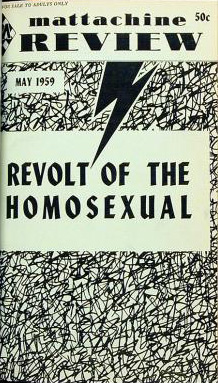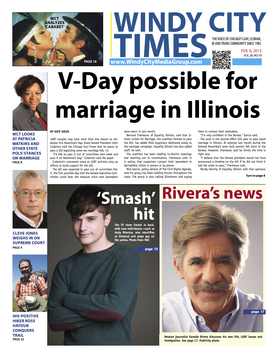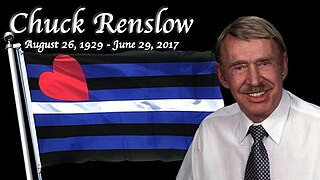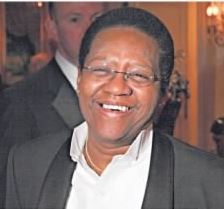Related Research Articles

The Mattachine Society, founded in 1950, was an early national gay rights organization in the United States, preceded by several covert and open organizations, such as Chicago's Society for Human Rights. Communist and labor activist Harry Hay formed the group with a collection of male friends in Los Angeles to protect and improve the rights of gay men. Branches formed in other cities, and by 1961 the Society had splintered into regional groups.
PFLAG is the United States' largest organization dedicated to supporting, educating, and advocating for lesbian, gay, bisexual, transgender, and queer (LGBTQ+) people and those who love them. PFLAG National is the national organization, which provides support to the PFLAG network of local chapters. PFLAG has nearly 400 chapters across the United States, with more than 350,000 members and supporters.

Windy City Times is an LGBT newspaper in Chicago that published its first issue on September 26, 1985.
This is a list of notable events in the history of LGBT rights that took place in the 1960s.

LGBTQ movements in the United States comprise an interwoven history of lesbian, gay, bisexual, transgender and queer social movements in the United States of America, beginning in the early 20th century. A commonly stated goal among these movements is social equality for LGBTQ people. Some have also focused on building LGBTQ communities or worked towards liberation for the broader society from biphobia, homophobia, and transphobia. LGBTQ movements organized today are made up of a wide range of political activism and cultural activity, including lobbying, street marches, social groups, media, art, and research. Sociologist Mary Bernstein writes:
For the lesbian and gay movement, then, cultural goals include challenging dominant constructions of masculinity and femininity, homophobia, and the primacy of the gendered heterosexual nuclear family (heteronormativity). Political goals include changing laws and policies in order to gain new rights, benefits, and protections from harm.
The U.S. state of Illinois has an active LGBT history, centered on its largest city Chicago, where by the 1920s a gay village had emerged in the Old Town district. Chicago was also the base for the short-lived Society for Human Rights, an early LGBT rights advocacy organization (1924).

LGBTQ history in the United States consists of the contributions and struggles of lesbian, gay, bisexual, transgender and queer (LGBTQ) people, as well as the LGBTQ social movements they have built.
The LGBTQ community in Chicago is one of the United States' most prominent, especially within the Midwest, alongside those of San Francisco and New York City, and holds a significant role in the progression of gay rights in the country. With a population of around 3 million, Chicago is the third biggest city in the US, and around 150,000 of those people identify as lesbian, bisexual, gay, transgender, questioning, or other.

Charles "Chuck" Renslow was an American businessman, known for pioneering homoerotic male photography in the mid-20th-century US, and establishing many landmarks of late-20th-century gay culture and leather culture, especially in the Chicago area. His accomplishments included the cofounding with Tony DeBlase of the Leather Archives and Museum, the co-founding with Dom Orejudos of the Gold Coast bar, Man's Country bathhouse, and the International Mr. Leather competition, and the founding by himself alone of Chicago's August White Party, and the magazines Triumph, Rawhide, and Mars. He was a romantic partner of Dom Orejudos as well as Chuck Arnett, Samuel Steward, David Grooms, and Ron Ehemann.
William B. Kelley was a gay activist and lawyer from Chicago, Illinois. Many laud him as an important figure in gaining rights for gay people in the United States, as he was actively involved in gay activism for 50 years.

This is a timeline of notable events in the history of the lesbian, gay, bisexual, and transgender community in the United States.

Vernita Gray was an African-American lesbian and women's liberation activist from the beginning of those movements in Chicago. She began her writing career publishing in the newsletter Lavender Woman. After owning and operating her own restaurant for almost a decade, Gray became the LGBT liaison for the Cook County State's Attorney's office. In 2013, she and her partner became the first same-sex partners to wed in Illinois.
The Chicago Lesbian Liberation (CLL) was a gay liberation organization formed in Chicago for lesbians during the Women's liberation movement (WLM). The group was originally part of an organization for both men and women, but in 1971, the women broke off to form their own group. CLL was involved in publishing a newspaper, Lavender Woman, helping to set up the first Chicago Pride Parade and the first all-women's dance in Chicago.
LGBT culture in St. Louis is characterized by a long history of progressive activism as well as racial divisions and the city/county divide. St. Louis city is relatively liberal with multiple gayborhoods and several LGBT organizations. In 2019, Realtor.com dubbed St. Louis the 8th most LGBT-friendly city. Due to hostile legislation at the state level, however, it has become common for LGBT residents to relocate to Illinois for better protections and healthcare access.
Margaret Ann "Peg" Grey was an American physical education teacher and sports organizer based in Chicago. She was the first female co-chair of the Federation of Gay Games. She was inducted into the Chicago LGBT Hall of Fame in 1992.
Tracy Baim is a Chicago-based LGBT journalist, editor, author, and filmmaker. She is also a former publisher of the Chicago Reader newspaper.
The Fun Lounge police raid was a 1964 police raid that targeted Louie's Fun Lounge, a gay bar near Chicago, Illinois, United States. The raid led to the arrest of over 100 individuals and is considered a notable moment in the LGBT history of the area.
Joanne E. Trapani was an American activist and politician. She was the first open lesbian elected official in Illinois when she won a seat on the village board of Oak Park in 1997, and she was inducted into the Chicago LGBT Hall of Fame in 1993.
References
Citations
- 1 2 "Hanover, Renee C." Chicago Tribune. 7 January 2011. Retrieved 2018-06-03– via Newspapers.com.
- 1 2 3 4 5 Baim, Tracy (5 January 2011). "Renee Hanover dead at 84". Windy City Times. Archived from the original on 2 June 2018. Retrieved 2018-06-02.
- 1 2 3 4 5 6 Kantzavelos, Maria (15 July 2011). "Memorial Will Remember Life of Lesbian Activist and Lawyer" (PDF). Chicago Daily Law Bulletin. 157 (138). Archived from the original (PDF) on 3 June 2018.
- ↑ Sutton, Roger; Ebright, Lisa (1994). Hearing Us Out : Voices From the Gay and Lesbian Community . Boston: Little, Brown. pp. 93. ISBN 0316823260 – via Internet Archive.
- 1 2 Baim 2009, p. 76.
- ↑ Rivas, Jorge (2011-01-20). "Today's Love Goes to Civil Rights Lawyer Renee Hanover | ColorLines". ColorLines. Archived from the original on 26 March 2016. Retrieved 2018-06-03.
- 1 2 3 Kleiman, Carol (6 February 1972). "Legal Help for Harassed Sisters". Chicago Tribune. Retrieved 2018-06-02– via Newspapers.com.
- ↑ Croix, St Sukie de la (2012). Chicago Whispers: A History of LGBT Chicago before Stonewall. Madison, Wisconsin: University of Wisconsin Pres. p. 263. ISBN 9780299286934.
- 1 2 Baim 2009, p. 91.
- ↑ Stewart-Winter, Timothy (2016-02-01). "Beyond Stonewall: How Gay History Looks Different From Chicago". Slate. ISSN 1091-2339. Archived from the original on 17 January 2018. Retrieved 2018-06-04.
- ↑ "Longtime Lesbian Activist Dies". Advocate. 2011-01-06. Archived from the original on 4 June 2018. Retrieved 2018-06-04.
- 1 2 "Renee C. Hanover". Chicago LGBT Hall of Fame. Archived from the original on 2 June 2018. Retrieved 2018-06-02.
Sources
- Baim, Tracy (2009). Out and Proud in Chicago: An Overview of the City's Gay Community. Chicago, Illinois: Agate Publishing. ISBN 978-1-57284-643-2.